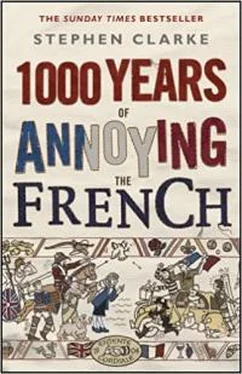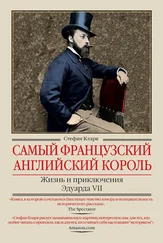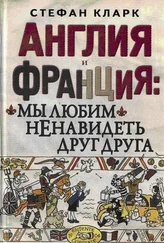Стефан Кларк - 1000 Years of Annoying the French
Здесь есть возможность читать онлайн «Стефан Кларк - 1000 Years of Annoying the French» весь текст электронной книги совершенно бесплатно (целиком полную версию без сокращений). В некоторых случаях можно слушать аудио, скачать через торрент в формате fb2 и присутствует краткое содержание. ISBN: , Издательство: Transworld Digital, Жанр: Старинная литература, на английском языке. Описание произведения, (предисловие) а так же отзывы посетителей доступны на портале библиотеки ЛибКат.
- Название:1000 Years of Annoying the French
- Автор:
- Издательство:Transworld Digital
- Жанр:
- Год:неизвестен
- ISBN:9781407067629
- Рейтинг книги:3 / 5. Голосов: 1
-
Избранное:Добавить в избранное
- Отзывы:
-
Ваша оценка:
- 60
- 1
- 2
- 3
- 4
- 5
1000 Years of Annoying the French: краткое содержание, описание и аннотация
Предлагаем к чтению аннотацию, описание, краткое содержание или предисловие (зависит от того, что написал сам автор книги «1000 Years of Annoying the French»). Если вы не нашли необходимую информацию о книге — напишите в комментариях, мы постараемся отыскать её.
1000 Years of Annoying the French — читать онлайн бесплатно полную книгу (весь текст) целиком
Ниже представлен текст книги, разбитый по страницам. Система сохранения места последней прочитанной страницы, позволяет с удобством читать онлайн бесплатно книгу «1000 Years of Annoying the French», без необходимости каждый раз заново искать на чём Вы остановились. Поставьте закладку, и сможете в любой момент перейти на страницу, на которой закончили чтение.
Интервал:
Закладка:
This linguistic trend was intensified because the Anglo-Norman monks, who had formerly lived like lords of the manor in their monasteries, died out in massive numbers during the plague, having been inadvertently targeted by victims who came to them in hope of a miracle, or at least to receive the last rites. Now these Norman- and Latin-speaking monks were replaced by English-speakers, who were much humbler than their predecessors, and undertook an educational mission, teaching ordinary folk to read and write – in English.
All of which explains why the period just after the Black Death marks the final triumph of English in England. In 1362, Parliament was opened for the first time with a speech in English. In the same year, it was decreed that court cases should be heard in English because Norman French was no longer understood by enough people. This was apparently an overstatement, but such pro-English exaggerations were obviously in fashion, because two English diplomats of the time were reported to have refused to speak French on the grounds that it was ‘as unintelligible to them as Hebrew’.
English, with its Anglo-Saxon roots and its hybrid Anglo-Saxon–Norman grammar, which had been growing like a fungus beneath the boots of the Anglo-Norman nobles, was finally gaining respect as more than a crude dialect used by peasants to grunt at each other. By 1385, the scholar John Trevisa was writing that ‘in alle the gramere scoles of Engelond, children leveth Frensche and lerneth in Englische.’ (Note the similarity of his spelling to that of modern English schoolchildren.) He even went so far as so say that English children knew as much French ‘as their left heel’. (Again, just like modern kids.)
As we saw above, King Edward III knew English, and everyone was pleasantly surprised that he spoke it so fluently – he was apparently very good at swearing, having discovered right from the start that English was a much better language than French for cussing. By tacking on the Anglo-Saxon preposition ‘off’, English can turn pretty well any aggressive or rude-sounding word into an insult, and has both (harsh-sounding) Anglo-Saxon and (usually corrupted) Norman-French words to play with. French is just too Latin-based and grammatically prudish to achieve this.
Edward might have been fluent in English, but he had learned it as a second language, and his first language was a French quite similar to that spoken by his enemy King Philippe. It was also still the chic way to express oneself at court, as Edward demonstrated with the famous ‘dropped garter’ incident in 1348.
During a ball at Windsor, the Countess of Salisbury’s garter fell off while she was dancing with King Edward. He picked it up and attached it to his own leg, lapsing into French when he saw his courtiers raising an eyebrow – ‘Honi soit qui mal y pense,’ he blurted out, which might be roughly translated as ‘Shame on anyone who thinks I did that because I’m after a bit of nookie.’ The phrase was adopted as the motto for his newly founded Order of the Garter, and now figures on the British monarch’s coat of arms, above ‘Dieu et mon droit’.
However, by the time Henry V was giving his rousing speech before the Battle of Agincourt only sixty-seven years later, English would be the King’s first language, and no translations of his pronouncements would be necessary.
In short, the tiny fleas that brought the Black Death to Europe also released England from the stranglehold of its foreign official language. Appropriate, really, because ‘flea’ is an Anglo-Saxon word.
War delayed owing to sudden illness
Naturally enough, the Black Death put something of a damper on the Hundred Years War. Ambitious conquest plans were shelved, and the action during the plague consisted mainly of sorties by enterprising English knights who took small armies on cross-Channel chevauchées to see if there was anything left to steal.
Edward III himself had also started something of a stock market for hostages, and anyone returning from France with a valuable prisoner stood a good chance of selling him (or her – the French were outraged that abbesses were also being kidnapped) to the King. Edward would then contact the relatives of the rich captive and extort the full price.
Meanwhile, bands of English deserters took the concept of the chevauchée one step further by occupying French castles. Here they started extortion rackets, forcing everyone in the area to pay for ‘protection’ in wine, livestock or money, and bringing complete terror to the already desolate French countryside.
These bands of robbers gave themselves the innocent-sounding name of routiers , 6or ‘road travellers’, and their idea was taken up with gusto by other mercenaries. Soon, gangs of deserters from Gascony, Brittany, Spain and Germany were adding to the chaos. Interestingly, though, the French didn’t care which nationality was persecuting them – they referred to all the routiers as ‘ anglais ’. They also called the English ‘les goddams’, presumably because of their shocking habit of swearing while massacring people.
Henry V, much more than a funny haircut
The war was dragging its heels when Edward III died at the ripe old age of sixty-four in 1377, and was only kept going because so many Englishmen wanted the chance to hop across the Channel and make their fortune. Soldiering was as profitable a profession as modern-day football, with the added advantage that the opponents were likely to be hopelessly unfit peasants.
But England was suffering internal revolt, and King Richard II, the Black Prince’s son (the Black Prince had died, probably of cancer, before he could inherit the throne), sued for peace with France. In 1396, Richard even made an alliance with the French by marrying the new King Charles VI’s six-year-old daughter Isabelle. In 1398 he went one stage further and accepted a truce with France. Frustrated Englishmen began to moan that Richard II was a closet Francophile, and this was one of the contributory factors to his being deposed in 1399 and (so it was rumoured) poisoned in early 1400 – in those days, you stopped annoying the French at your peril.
The French themselves were not all in favour of appeasement, and might not have accepted the truce if King Charles VI hadn’t been a complete lunatic. He would often run around his castles howling like a wolf, and was convinced he was made of glass and that people wanted to smash him. In a fit of madness, he once killed four of his own courtiers.
This weakness at the top split France into two families warring for power – the Burgundians, led by Charles VI’s cousin Jean de Bourgogne, and the Armagnacs under Louis, Charles’s brother. Soon, both factions were committing atrocities that even outdid the chevauchées . The Armagnacs created a new terror, the écorcheurs (literally ‘men who will skin you alive’), that they inflicted on their own countrymen for a good thirty years.
The only real winners of this long period of in-fighting were the English, who sold their support to first one faction and then the other, promising to intervene but switching loyalties when they were offered more money and territory by the opposing side. And the biggest benefactor of all was a new English king, Henry V, who in 1414 made a treaty with the Armagnacs that at one stroke earned him the regions of Poitou, Angoulême and Périgord in the southwest of France, thereby restoring at least partly England’s old fortunes in that corner of the world.
Henry V, who was only twenty-six when he succeeded to the throne, was surrounded by very eligible male relatives, and needed to prove that he was a strong monarch. He was a born fighter, and wore his hair in the military pudding-bowl style of a helmet-wearing knight rather than the flowing regal locks of his recent ancestors. It is said that he was tall and so strong that he could walk in armour as though he was wearing a light cloak – no doubt because he had been put into battledress at an early age. While away persecuting Wales in his teens, he had been hit in the face by an arrow (they were still excellent shots, those Welsh archers), and was scarred for life – which is one of the reasons why his most famous portraits are all in profile.
Читать дальшеИнтервал:
Закладка:
Похожие книги на «1000 Years of Annoying the French»
Представляем Вашему вниманию похожие книги на «1000 Years of Annoying the French» списком для выбора. Мы отобрали схожую по названию и смыслу литературу в надежде предоставить читателям больше вариантов отыскать новые, интересные, ещё непрочитанные произведения.
Обсуждение, отзывы о книге «1000 Years of Annoying the French» и просто собственные мнения читателей. Оставьте ваши комментарии, напишите, что Вы думаете о произведении, его смысле или главных героях. Укажите что конкретно понравилось, а что нет, и почему Вы так считаете.












